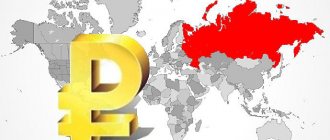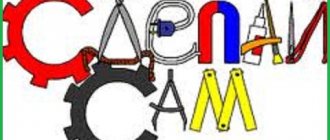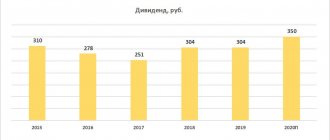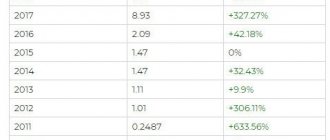How to achieve financial independence
Almost all people dream of achieving a level of well-being at which they don’t have to fight for every penny, that is, to gain financial stability.
But how difficult is it to become independent from money? As Natalya Pritchina, LIME correspondent, says, many have still not been able to solve this problem.
But if you follow simple strategies, it turns out that understanding how to achieve financial independence is very easy. Experts are sure that every person needs to understand this.
What is your financial condition?
Before you create a strategy for achieving financial independence, you need to decide on your current level. I made a slightly humorous chart, but it helps to clearly assess your financial status.
Level “Below the plinth”. Your expenses exceed your income. You don't even live paycheck to paycheck, but are forced to borrow from friends, relatives or the bank. Any force majeure situation is a disaster for you.
Level “Plinth”. You are standing on a hard surface. Expenses equal income. There are no debts or their payments are already included in your monthly expenses, so you pay them off easily. There is no talk of any savings. But force majeure situations are still a disaster.
Level “Above the baseboard”. Your income exceeds your expenses. You set aside some of the money for a rainy day. In any force majeure situation, you have money without going into debt.
Level “Dream Skirting”. You have achieved financial independence. You have formed a “safety cushion”, you have savings in various assets that bring a stable income that covers not only your current expenses, but also allows you to realize your wildest dreams. At the same time, capital only increases over the years.
After reading, you will understand how to stop working for pennies at a job you don’t like and start LIVING truly freely and with pleasure!
So what step are you on? For example, my place today is “Above the Baseboard”. My husband and I have formed an emergency fund and are actively saving money for further investment in various instruments. In less than a year, we will have enough money to invest in some of the assets available to us. It would seem that all we have to do is step up one step and we are financially independent. But this step is the most difficult and time-consuming.
Let's look at all the stages of achieving financial independence in more detail.
Strategy 3. Cash flow control
After drawing up a plan, it is necessary to take into account all existing income and expenses. Katerina Zhizhina also thinks so, saying that it is boring and boring, but without this there cannot be a significant increase in well-being. Any earnings can be spent quickly and ineptly: 15 thousand rubles, and 15 million rubles. It's not about the amount of income as such, but about the attitude towards money. Rockefeller always scrupulously and carefully analyzed all expenses, even when he became a multimillionaire.
Be sure to count your money and budget carefully. Only by knowing the current state of affairs and planning your expenses ahead can you move towards financial independence. Moreover, managing a budget has now become much easier, according to Leysan Khalikova, an expert at VIGTrans, reporting that many applications have appeared on the phone that help keep track of expenses and income, as well as set aside a certain amount for your goals. This is a very convenient tool that really works and helps develop self-discipline.
Natalia Pritchina, LIME: “Developing a budget is a necessary element in order to stick to your main goals. Try it yourself: a well-drafted financial plan will become your main assistant in setting priorities. Thanks to it, you can avoid unnecessary impulsive spending. Don’t forget the most important thing: when money is spent haphazardly, there is always a chance that you will be left broke a few days before payday.”
Path to the Top
To get out of the quagmire of financial insolvency, it is useful to listen to the recommendations of experts. It’s worth starting by determining your level of financial status:
- Expenses significantly exceed income - financial bottom.
- Income equals expenses—prosperity.
- The ability to make minor investments is independence.
- The interest on investments is commensurate with expenses and even exceeds them - financial freedom.
If you are at the first level (in the hole), you have to go through all subsequent stages, and only then financial freedom will be yours.
You can start learning the skills of a financially free person in the financial game "Cash Flow", founded by the author of the best-selling book "Rich Dad Poor Dad" Robert Kiyosaki.
Stages
A little more about the stages you need to go through on the path to financial freedom.
Stage 1. If a person is in a financial hole, the first step is to move from this state to financial instability. To do this, you will need to get rid of debt, which can be achieved using two money management options:
- austerity. In this situation, you will need to save on everything;
- increase in active income. You will need to increase your income by changing your job to a higher paying one, looking for additional work and earnings, making money on the Internet, etc.
Stage 2. When a person has paid off all his debts and his income is equal to his expenses, he cannot relax. One wrong step can quickly lead you back into a financial hole. Now we will need to move from financial instability to stability. This stage is considered very important, since, having crossed it, a person overcomes the poverty line. At this stage it is necessary:
- continue to increase active income, creating new sources of profit;
- create reserve funds that can help out in case of emergencies;
- accumulate savings, gradually strengthening your material assets and acquiring everything you need for life;
- learn how to properly plan your personal budget.
At this stage, passive income will gradually begin to appear, which will bring savings in bank accounts. The stage can last for quite a long period of time (up to several years), but during this time a solid base of material and monetary assets is created, thanks to which it will be difficult to go back.
Stage 3. At this final stage, financial stability must transition into financial independence. In other words, this period can be called transitional from active sources of income to passive ones. For this you will need:
- creating personal capital, that is, preparing funds for investment;
- creating sources of passive income. You should not invest all your capital in one project, it is very risky. Sources of income should be as diversified as possible;
- gradual transition from active income to passive income.
Definition and essence
Financial goals are the most important guidelines in the life of any individual or family. Every person has the right to realize their own goals. In order for them to come to life, they must first be defined. When certain tasks are outlined and their necessity is realized, it is much easier to calculate expenses, save and save money.
Possible main financial goals of the family:
- Provide stable retirement income.
- Set aside funds for your children's education.
- Large purchases (apartment, car, cottage, etc.).
- Health and leisure expenses.
The most global and general goal is considered to be the achievement of financial freedom, that is, the presence of a certain capital that allows you to live without worrying about daily earnings. A person is confident in the future of his family, works for himself and takes responsibility for the well-being of his family into his own hands. He can freely choose a profession without fear of losing his job, and realize any of his plans or dreams.
What is financial freedom? This:
- do not live from paycheck to paycheck without any life prospects;
- do not blame yourself for having little earnings, but learn to live better than others with the money you earn;
- start earning 30% or more on the same job and without retraining;
- set aside savings to get rid of uncertainty about the stable situation of the family;
- pay off all debts and learn to live without them;
- solve the housing problem (with or without a mortgage);
- provide your children with a good education, help them master financial literacy, teach them how to make smart decisions and avoid making mistakes, etc.;
- buy housing where you want and do what you love;
- visit cafes and restaurants (at least occasionally) and travel;
- hire workers to do housework (for repairs, etc.);
- provide assistance to parents, children, grandchildren, etc.;
- do not interfere with money in family relationships, avoid quarrels over money;
- to be financially independent from children, parents, the state, etc.;
- enjoy life at any age and not be a burden to anyone;
- understand that happiness is not the amount of money.
It is necessary to understand that money is only a means or a tool for achieving material freedom, and not the main goal.
Types of capital
The main types of cash flows that make up the types of capital of ordinary people:
- Expenditure capital (daily expenses). This is money that is spent on household needs (food, accommodation, clothing, etc.).
- Accumulative capital. These are savings that are used for certain purposes (vacation, repairs, buying a TV or car, etc.).
- Reserve capital. This is a cash “safety cushion”, savings that will help you survive for some time (4 – 6 months) if your main income is lost. During this period of time, the source of income is restored. It is necessary to protect reserve funds from the risks of loss. In addition, money must work and make a profit. Bank deposits are the most optimal way to store reserve capital.
- Working capital. It is considered the most important component for gaining financial freedom. This is money invested in various assets (real estate, banks, stock market, etc.).
The main mistakes on the path to financial freedom
Often, a person who strives with all his might to gain financial freedom makes some mistakes that prevent him from achieving his ultimate goal. Below are the most common ones.
Mistake 1. Early transition to passive income
Sometimes it happens that a person, because of his wild desire to become financially free, while still in debt, begins to invest all his money. Which, in the event of an unfavorable outcome of events, drives oneself even deeper into debt.
The path to financial freedom should be gradual, moving from one stage to another. First, you must pay off your debts, increase your level of financial literacy and sources of active income, learn to manage your personal finances, and only after that can you begin to create passive sources of income. And not just one, but several.
Mistake 2. Fear
A poor person is simply pathologically afraid of changing something in his life, afraid of making mistakes, losing and failing. He's just afraid to take a risk and start life over again. That is why such a person, at best, stands still, but it also happens that he simply begins to fall into a hole of debt and slide down, lower and lower.
Before you begin your path to financial freedom, you need to overcome all your fears, make your face a “brick” and, simply, start and do.
Mistake 3. Partial or complete lack of risk diversification
Many novice investors, when creating sources of passive income, invest all their savings in just one type of income. There is a great risk of losing all your capital. In addition, one source of passive income has not yet made anyone a financially independent person. A person simply begins to depend on this source of income, having lost which he again finds himself in a beggarly position.
So when it's time to invest, spread your cash across multiple sources. This way you will protect yourself from losing all your savings and all sources of income. If you lose one, you will still have other income in your budget, and you will have something to live on.
Mistake 4. Careless attitude to expenses
You can often read on the Internet that you need to focus your attention on increasing your income rather than on your expenses. Thinking about how and where to save is a poor man's mentality that will prevent you from getting rich.
Maybe it is so. But if you think about it, you can understand that the amount of your expenses affects the amount of your investment capital. The more you spend, the less money you will have to invest and create passive income, therefore, your income will also be much less. If you pay attention only to increasing your income, you may not notice how your expenses will begin to exceed them. And then you can simply forget about financial freedom.
Mistake 5. Lack of control over your finances
It is always necessary to keep records of income and expenses, no matter what financial situation you are in or what income you receive. A person who wants to become financially independent and remain so for the rest of his life must always know when and how much income he receives, where and how much of this income he spends. Otherwise, you will very soon find yourself in a financial hole again.
Strict accounting of your personal finances will allow you to always navigate, control and analyze them well. Thanks to this, you will be able to make timely adjustments and take action if something goes wrong.
Mistake 6. Greed
There are people who strive to achieve their goal so quickly that they begin to invest their funds in all kinds of financial projects that guarantee enormous profits in the near future. And, what very often happens, they take out all possible loans for this business, being completely confident that they will become rich in the very near future and will be able to repay everything.
True, in reality it turns out that 99% of such projects are either a scam or a financial pyramid, and the person, with all his greed, ends up at the very bottom of the debt hole.
A novice investor must always remember that investing is not a short-term process, but a long and labor-intensive one, the positive results of which you will see no earlier than in a few years.
Mistake 7. Failure to reinvest profits
Many people at the very beginning of investing, after receiving the first profit, begin to use it for their needs and needs. This does not mean that these people are financially illiterate. It simply means that they still think like a poor person and act like an ordinary working class person.
Any professional in the field of investment and finance knows that all income received, especially at the very beginning of investing, should be used for further investment. This is called reinvesting profits.
Mistake 8. Worshiping money
Many even very successful investors remain dependent on money. They literally idolize them and cannot think about anything but them. Money begins to control them, and they begin to serve them. What makes people completely and completely dependent on money, which becomes their obsessive end in itself. In this case, there can be no financial freedom of speech.
If an investor really wants to become a financially free person, he must learn to treat money himself as an instrument that he himself manages, and which must work for him and begin to generate decent income. This is the law of money and wealth, without which it is impossible to become an absolutely financially independent person.
In conclusion, I would like to note that the path to financial freedom is a life-long road, along which you will have to make many mistakes and overcome many difficulties. The main thing is not to despair and move forward, draw conclusions from your own mistakes and learn, learn and learn again (first of all, from your own mistakes). As they usually say in these cases: “patience and work will grind everything down.” And always remember - the city takes courage.
If you liked the article and find it useful, PLEASE share it with your friends and acquaintances!!!
Also, you can express your opinion about the article in the comments. The MyRublik site will be very grateful to you.
Step 6. Value your vital energy - minimize expenses
The essence of this step is to use your vital energy wisely and consciously reduce or eliminate expenses. The goals of the step are to reduce your monthly expenses by eliminating unnecessary items and learn to choose quality of life over standard of living.
frugality is at the center of this chapter . To be frugal means to strive to have enough rather than more, to choose quality rather than status, and to use everything to its fullest . This does not mean being stingy at all. The stingy person chooses not quality, but the cheapest and pays twice. Thrift puts the value of life energy and its reasonable expenditure at the forefront.
The authors give many ways to save money - not specific discounts and promotions, of course, they always change and cannot be included in a book, but universal criteria for a reasonable approach to consumption. One of the main ways to save money is to stop trying to impress other people .
Other people are so busy trying to impress you that they are unlikely to notice your efforts to impress them.
Status goods take away much more than they give in return. In addition to this advice, the book lists 10 more (more like 9):
- Don't go shopping . If you need to buy something, go and buy it. Don't wander around the store looking for expenses. They are designed in such a way that you find the maximum number of products you do not need. Anything purchased in this state of passion will not pass the test of necessity in the monthly table.
- Live within your means . In the era of affordable credit, not everyone will remember what this means. Buy only what you can afford in savings. Avoid debt, because the price of being able to get something immediately is the extra expenditure of vital energy on interest on the loan in the future. Use a loan as a last resort, but only if you are sure you can pay it back quickly and when you have savings for a rainy day.
- Take care of what you have . First of all, we are talking about our own body. Proper brushing of teeth saves a lot of money on their treatment. Paying attention to your health and regular check-ups allows you to do the same, and also prolong and save your life. This attitude can also be extended to items that require regular maintenance to prolong their service life.
- Wear things out . If it weren't for fashion and boredom, we would all wear the same thing for years, carry the same smartphone, and the list goes on. Before you buy something new, make sure the old one is really old. However, you shouldn’t go too far either - if a thing ruins your life with breakdowns and profitable repairs are impossible, it’s better to replace it.
- Do it yourself . For every task today there is a person who will provide you with a service for money and life energy. But much of this is not difficult to do on your own, and often the result will be not only cheaper, but also better (if you want it done well, do it yourself). Before you buy something, ask yourself whether it is difficult to learn how to do it yourself and whether this skill will be useful in the future.
- Anticipate needs . The ability to predict future purchases can help you save money. If you notice in advance that you will soon have to buy something, you can wait for a good discount. Or just buy it in a more convenient place, and not in an expensive store around the corner, when you need it now.
- Research value, quality, durability, multiple uses, and price . The choice of any somewhat expensive product must be approached responsibly. Today it’s easier than ever - price aggregators and an abundance of reviews on the Internet allow you to choose the best price-quality product in your category.
- Buy cheaper . Things are not worth what they are asking for. They are worth what they give for them. Use the same price aggregators and any applications to monitor discounts, buy used and bargain.
- Find another way . Think about what need you really want to satisfy with your purchase. What else can satisfy her? Replace an expensive product with a cheaper one, or maybe it will not be a product, but a service. Or even something free. In fact, people usually don't want a huge car, but respect. Not crammed closets, but looking attractive. Not a new laptop, but doing something useful. They want variety and beauty, to experience emotions. All this does not always depend on the status of the product.
- Follow the 9 steps . All of them are important and help transform your attitude towards money and the material world.
Let's summarize: step-by-step plan
So here's a step-by-step plan for achieving financial freedom:
- Put your finances and your head in order, determine expenses, income, assets, liabilities and balance debits with credits.
- Determine what step of the financial independence ladder you are on.
- Make a plan for moving to the next stage based on your input data.
- Cut expenses and pay off debts. At least to a sane level.
- At the same time, find ways to increase income. You start with active methods and gradually transfer capital to passive sources of income. Or you can create such sources yourself.
- You form a money-box and don’t spend it anywhere. This is your NZ in case of force majeure.
- Be sure to invest. Determine the amount you will invest: a fixed amount, a percentage of income or your entire salary.
- Stick to the plan and do not increase expenses in parallel with income growth.
Consistently completing these steps will allow you to gain financial freedom within the time frame you set. Don't hesitate, but move on to implementing the plan! Good luck, and may the money be with you!
Rate this article
[Total votes: Average rating: ]











